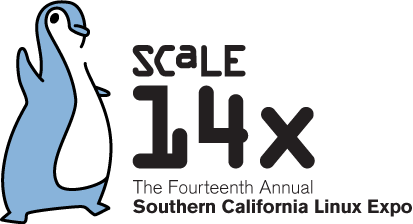Some of you may have noticed that there are optional demographic questions on this year’s registration and CFP forms. I want to talk a little about why we’re doing this and what’s to come. But first let’s take a step back.
SCALE has a long tradition of making strong efforts to be as inclusive as possible. We helped found and hosted the Women in Open Source conference for four years. We built a game night which provided not only an awesome time, but a venue for socializing for those who didn’t want to drink. Recently we’ve fostered youth of all variety with our The Next Generation track which is run by, features, and caters to young adults who have a passion for open source. All of these efforts were spearheaded and supported by different people throughout the SCALE staff. They’ve all done great things to welcome new and different people to our conference and to open source in general.
However there was never any single person or group whose job was to think about these efforts in a more holistic way.
The idea came up on the SCALE chairs list to start a diversity committee. Not to take over these activities - but to continue to ensure they get the support they need and to think of them in the bigger picture. Since I have done diversity work in a variety of arenas and given my history with SCALE, I was asked if I’d be interested. I was honored to take up the challenge.
Of course, it is not lost on me that as a white male I’m not a great representation of minorities in tech. I’ve asked Jenn Greenaway, Hannah Anderson, and Alan Willis to join me in this effort to provide perspectives different from my own and keep me in check. Jenn is an early education specialist who works with infants and toddlers by trade and also a self-described open-source enthusiast. You may have caught one of her talks at SCALE 12X and 13X. Hannah has long been involved in the tech community having worked at companies such as AppScale and Eucalyptus and is the co-chair of the SCALE Publicity Committee. Alan Willis is a Systems Engineer at Riot Games. Between the four of us, we have a variety of perspectives.
So, say hi to the new SCALE Diversity Committee. We’re glad to meet you.
Before I get into what we want to do, I want to say a few words about my perspective on diversity.
The world "diversity" conjures up different feelings and images for different people. People strive for diversity in different spaces for different reasons. Commonly cited reasons are fairness, altruism, equality, equity, etc. All of which are great reasons I fully support. And I will happily discuss those reasons with anyone who wants to. But there’s another reason…studies show more diverse groups of people make better decisions, better products, and have better outcomes. If everyone in a room thinks the same way the number of ideas available does not grow significantly. We will be better engineers, better leaders, better companies, and a better society with more balance of experience, thought, and background at our disposal. Diversity is in everyone’s best interest, not just the underrepresented. This argument makes both a social case and business case. It’s the reason I prefer to focus on to avoid the distraction of varying levels of altruism.
So with that said, let’s get back to those demographic questions.
As any engineer will tell you, you can’t make progress on a problem if you don’t know where you stand. We need to have enough data to understand where to best focus our efforts. So we want to get an idea of where our demographics lie. In the past few years tech companies have started to publish diversity numbers. This was a huge step for the tech industry - it showed where we were and how far we had (and have) to go; it enabled a discussion that was just not possible before that.
So the first thing I’d like to do is look at the numbers going into the CFP process and compare them to the numbers coming out of it. Taking gender as an example, if the percent of speakers who identify as women is greater than or equal to the percentage of proposals from individuals who identify as women, then it’s a good sign our process doesn’t bias against women. If it’s not, than we know we have a bias there. We can compare similarly for non-binary gender, different races, etc., etc. Such a clear comparison isn’t obvious for attendees, but we’d like to at least track if we’re getting better or worse. We won’t tackle every possible group on day one, we’ll start somewhere and iterate. So we’ll be crunching numbers after SCALE 14X to see where we stand.
And in true open source fashion we’ll release the results - regardless of what they say. And then we’ll work to make them better. We hope this will encourage other technical conferences to come forward with their numbers. I’d like to see a world where we can all work together to have a more diverse group of people around us.
If you have questions, feel free to email me or find me at SCALE 14X!
Phil Dibowitz
Diversity Committee Chair


